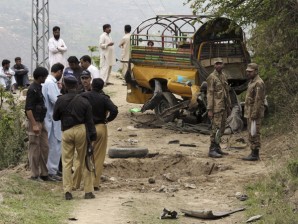Pakistan bomb attacks kill 3, injure 49—officials

Pakistani police officers and army soldiers gather at the site of a bomb explosion in Banjot village, Pakistan, on April 14, 2013. Three bomb explosions killed three people including a young girl in Pakistan’s port city of Karachi on Saturday, April 27, 2013, police and hospital officials said, in the latest violence ahead of polls next month. AP PHOTO/NAVEED ALI
KARACHI—Three bomb explosions killed three people including a young girl in Pakistan’s port city of Karachi on Saturday, police and hospital officials said, in the latest violence ahead of polls next month.
The blasts, two of which targeted secular political parties and another close to a Shiite mosque, came a day after a car bomb at a political meeting in the same city killed at least 10 people.
“The first bomb, which was planted near the office of the MQM (Muttahida Qaumi Movement) in Qasba Colony area killed one person and wounded 24 others,” local police official Zahid Hussain told AFP.
He said the MQM office was the target but it was not open at the time of the explosion, adding that in the second attack a hand grenade was hurled near a Shiite mosque injuring 10 people.
In the third blast, which took place during a campaign meeting of a Pakistan People’s Party (PPP) candidate in Lyari neighborhood, two people including a seven-year-old girl were killed and 15 others were wounded, police official Muhammad Azim said.
Article continues after this advertisementHe said that the bomb had been planted on a motorbike.
Article continues after this advertisementPolice surgeon Aslam Pechuho also confirmed the toll from the three attacks.
The MQM and the Awami National Party (ANP), which was targeted in Friday’s attack, were coalition partners in the outgoing PPP-led government and have been threatened by the Taliban.
The three parties are perceived as secular and backed military operations against the Islamists.
As a result of the threats, there have been few large-scale political rallies leading to a lacklustre campaign for the elections.
Amnesty International has also called on Pakistan to investigate the recent wave of attacks, which have resulted in dozens of casualties nationwide and ensure adequate protection for election candidates.
May 11 national polls should see power pass from a civilian government that has served a full term to another through the ballot box for the first time in the nuclear-armed country’s turbulent history.